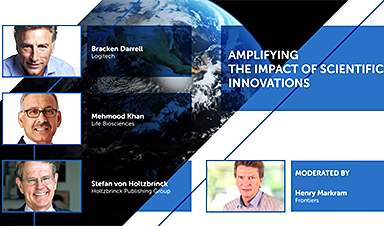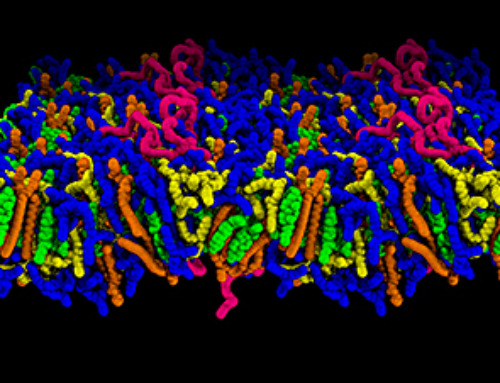

From Frontiers Forum:
How can research translate to R&D? Or a whole new business venture? In a panel session at Science Unlimited 2019, Holtzbrinck Publishing Group CEO Stefan von Holtzbrinck, Life Biosciences CEO Mehmood Khan, Logitech CEO Bracken Darrell and EPFL’s Henry Markram discussed innovation, R&D and successful technology transfer.
Stefan von Holtzbrinck, Holtzbrinck Publishing Group
Stefan von Holtzbrinck is CEO of the family-owned Holtzbrinck Publishing Group. He has 20 years’ experience in science communication, including 3 years as MD of Nature Publishing Group. The Holtzbrinck Publishing Group has majority holdings in Springer Nature (of which Stefan is Chairman of the Supervisory Board), Digital Science, DIE ZEIT and Macmillan, and investments in Holtzbrinck Ventures, Frontiers, AMBOSS, GSV AcceleraTE and Rethink Education fund. Stefan is a member of the Executive Committee of the Max Planck Society.
Mehmood Khan, Life Biosciences
Mehmood Khan is CEO and Board Member of Life Biosciences Inc, where he provides strategic direction and operational oversight. He was previously Vice Chairman and Chief Scientific Officer of Global Research and Development at PepsiCo and President of Global R&D at Takeda Pharmaceuticals. Before moving into industry, Mehmood had a distinguished medical career, including as a faculty member in endocrinology at the Mayo Clinic and Mayo Medical School where he served as Director of the Diabetes, Endocrine and Nutritional Trials Unit.
Bracken Darrell, Logitech
Bracken Darrell is President and CEO of Logitech, the largest Swiss consumer electronics company with CHF 3 billion in annual revenues. He is responsible for the company’s strategy for growth and profitability, for the vision for the brand as well as for the company’s operations. Logitech has been a top performer on both the Nasdaq and Swiss stock exchanges. The company value has risen by over 500 percent in the past seven years as the company has moved from PC peripherals to new categories and new brands.
Henry Markram, EPFL
Henry Markram has pioneered simulation neuroscience as a new path to understanding how the brain works. As Professor of Neuroscience at the Swiss Federal Institute of Technology in Lausanne (EPFL), he founded the Brain Mind Institute, the Blue Brain Project and the Human Brain Project, a €1 Billion European initiative to simulate the brain. His research has shifted from experimentally reverse engineering neocortical tissue to developing a software ecosystem and algorithms to convert biological data into detailed digital reconstructions of brain tissue.
Image Credit: Amanda Scott – Alias Studio Sydney
News This Week
How lipid nanoparticles carrying vaccines release their cargo
A study from FAU has shown that lipid nanoparticles restructure their membrane significantly after being absorbed into a cell and ending up in an acidic environment. Vaccines and other medicines are often packed in [...]
New book from NanoappsMedical Inc – Molecular Manufacturing: The Future of Nanomedicine
This book explores the revolutionary potential of atomically precise manufacturing technologies to transform global healthcare, as well as practically every other sector across society. This forward-thinking volume examines how envisaged Factory@Home systems might enable the cost-effective [...]
A Virus Designed in the Lab Could Help Defeat Antibiotic Resistance
Scientists can now design bacteria-killing viruses from DNA, opening a faster path to fighting superbugs. Bacteriophages have been used as treatments for bacterial infections for more than a century. Interest in these viruses is rising [...]
Sleep Deprivation Triggers a Strange Brain Cleanup
When you don’t sleep enough, your brain may clean itself at the exact moment you need it to think. Most people recognize the sensation. After a night of inadequate sleep, staying focused becomes harder [...]
Lab-grown corticospinal neurons offer new models for ALS and spinal injuries
Researchers have developed a way to grow a highly specialized subset of brain nerve cells that are involved in motor neuron disease and damaged in spinal injuries. Their study, published today in eLife as the final [...]
Urgent warning over deadly ‘brain swelling’ virus amid fears it could spread globally
Airports across Asia have been put on high alert after India confirmed two cases of the deadly Nipah virus in the state of West Bengal over the past month. Thailand, Nepal and Vietnam are among the [...]
This Vaccine Stops Bird Flu Before It Reaches the Lungs
A new nasal spray vaccine could stop bird flu at the door — blocking infection, reducing spread, and helping head off the next pandemic. Since first appearing in the United States in 2014, H5N1 [...]
These two viruses may become the next public health threats, scientists say
Two emerging pathogens with animal origins—influenza D virus and canine coronavirus—have so far been quietly flying under the radar, but researchers warn conditions are ripe for the viruses to spread more widely among humans. [...]
COVID-19 viral fragments shown to target and kill specific immune cells
COVID-19 viral fragments shown to target and kill specific immune cells in UCLA-led study Clues about extreme cases and omicron’s effects come from a cross-disciplinary international research team New research shows that after the [...]
Smaller Than a Grain of Salt: Engineers Create the World’s Tiniest Wireless Brain Implant
A salt-grain-sized neural implant can record and transmit brain activity wirelessly for extended periods. Researchers at Cornell University, working with collaborators, have created an extremely small neural implant that can sit on a grain of [...]
Scientists Develop a New Way To See Inside the Human Body Using 3D Color Imaging
A newly developed imaging method blends ultrasound and photoacoustics to capture both tissue structure and blood-vessel function in 3D. By blending two powerful imaging methods, researchers from Caltech and USC have developed a new way to [...]
Brain waves could help paralyzed patients move again
People with spinal cord injuries often lose the ability to move their arms or legs. In many cases, the nerves in the limbs remain healthy, and the brain continues to function normally. The loss of [...]
Scientists Discover a New “Cleanup Hub” Inside the Human Brain
A newly identified lymphatic drainage pathway along the middle meningeal artery reveals how the human brain clears waste. How does the brain clear away waste? This task is handled by the brain’s lymphatic drainage [...]
New Drug Slashes Dangerous Blood Fats by Nearly 40% in First Human Trial
Scientists have found a way to fine-tune a central fat-control pathway in the liver, reducing harmful blood triglycerides while preserving beneficial cholesterol functions. When we eat, the body turns surplus calories into molecules called [...]
A Simple Brain Scan May Help Restore Movement After Paralysis
A brain cap and smart algorithms may one day help paralyzed patients turn thought into movement—no surgery required. People with spinal cord injuries often experience partial or complete loss of movement in their arms [...]
Plant Discovery Could Transform How Medicines Are Made
Scientists have uncovered an unexpected way plants make powerful chemicals, revealing hidden biological connections that could transform how medicines are discovered and produced. Plants produce protective chemicals called alkaloids as part of their natural [...]






















Leave A Comment